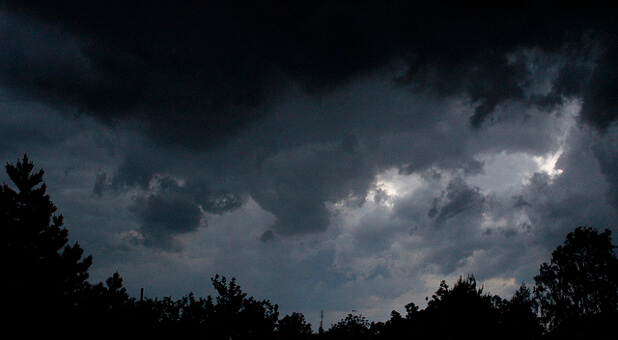I remember the first time we took our children to Disneyland. Our youngest, then three-year-old George Paul, enjoyed himself until we took the Pirates of the Caribbean ride.
The minute our boat embarked from the dock and entered an artificial moonlit lagoon with pirate ships and cannon shots plopping into the water, he became afraid. His fear worsened as we sailed through make-believe pirate-infested caverns and a shoot-’em-up village. When we came to the final moments of the ride, hurtling down the rapids within a dark tunnel, his terror knew no bounds. He clung to me like a drowning cat, fingers dug into my neck and arms, screaming.
For years there was no way I could talk him into going on the ride again. In his mind, the events he had witnessed were real and life threatening. He wanted no further part in them.
David experiences his own Pirates of the Caribbean ride through the circumstances of Psalm 27, although his life situation is not make-believe. Twice in the first verse he reacts to the danger about him with questions: “Whom shall I fear?” and “Of whom shall I be afraid?”
His psalm gives us words to pray when we too feel vulnerable and exposed to harm.
Fear
Perhaps the source of danger for you lies not with other people as it was with David. Your enemies may be the darker fears of nonfulfillment, emptiness, dysfunction, unhappiness, futility, insecurity, or desperate loneliness.
No matter whether your fears are external or internal, verse 1 declares the Lord is three things against your fear.
1. Light. He illumines through His Word and Spirit the darkness within you and within your circumstances.
2. Salvation. He not only turns on the light, but He gets you out of captivity.
3. Stronghold. In Him you gain the position of height, advantage, defensibility, perspective, and security against all your foes.
Thus David answers his own questions in verses 2 and 3, armed with the assurance that evil men, enemies, foes, and even a besieging army will not prevail against him—”even then will I be confident.”
Evidently David wrote Psalm 27 when he was far from sanctuary—out in the rocks and caves of Judea. Although the temple had not yet been built, he was already envisioning it and expressing his one desire to be safe in the sanctuary where he could gaze upon the beauty of the Lord. (See vv. 4–6.) What’s your one desire when you are in a storm?
Uncertainty
Note that the tenor of the psalm changes with verse 7. The first six verses have expressed exquisite trust in God, but the certainty of David seems to momentarily waver in his prayer of verses 7 through 14.
This psalm is so much like our spiritual pilgrimage: three steps forward, two steps back. One moment David longs to look into the Lord’s face, and the next moment doubt enters: Will the Lord hide His face? Will He turn away in anger? Will He reject or forsake? (See vv. 7–9.)
Assurance
But the assurance returns. There is constancy in God. He does not abandon or betray us. When you have had the experience of being “left,” you can fully appreciate the contrast in God’s love, “Though my father and mother forsake me, the Lord will receive me” (v. 10).
Held tightly by the love that will not let him go, David invites the Lord to teach him, to lead him, and to protect his life. (See vv. 11,12.) He closes the psalm in the confidence with which it began. The goodness of the Lord will not be seen in just the hereafter, but now “in the land of the living” (v. 13).
To fellow pilgrims and strugglers, David calls out: “Wait for the Lord; be strong and take heart and wait for the Lord” (v. 14). But it’s so hard to wait . . . to live a day at a time, an hour at a time, and even on occasion a minute at a time.
Psalm 27 addresses the wild rides in life—even the ones that are for real. God always grips tightly those who trust Him. Paul experienced God’s protection when his boat was driven across the raging starless Mediterranean (Acts 27), and the disciples knew the power of the Lord over great storms. (See Mark 4:35–41; 6:45–52.)
Someone has said, “God is going to pull you through, if you can stand the pull.” When we trust Him even in our most desperate moments, we too discover His faithfulness toward us.











































